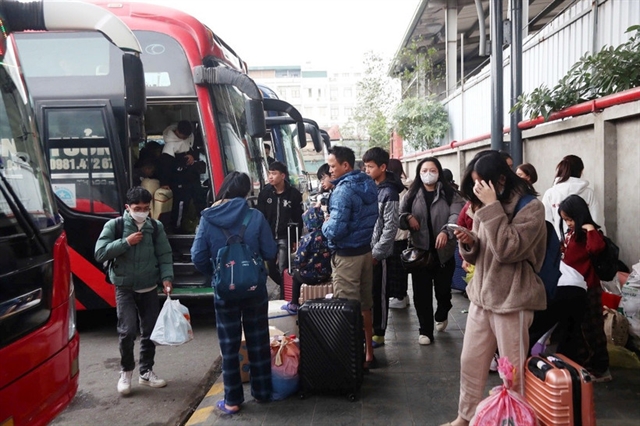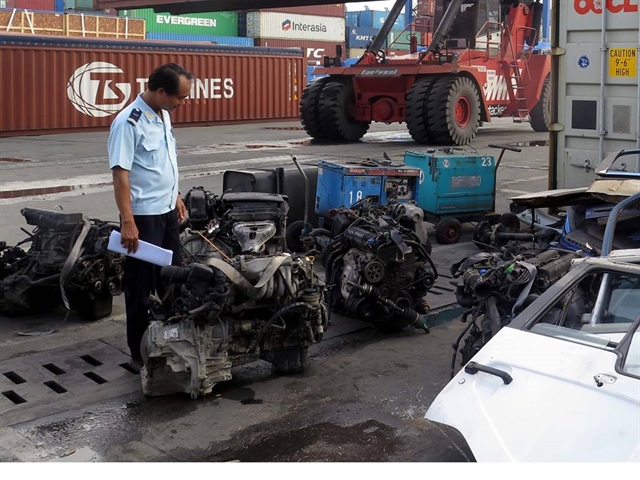 Expat Corner
Expat Corner

In Uganda, egg-chapati is also known as Rolex, making many people mistakenly think this dish is related to the famous Swiss watch brand. In fact, this name comes from the strong pronunciation of the word 'rolled egg' by the locals, causing diners to mishear it as 'rolex'. The misinterpretation has stuck.
Bảo Ngọc
During the extended COVID-19 restrictions last year, many expats in Việt Nam had their lives turned upside down.
Many decided to return home, but for Abdul Dogday, COVID-19 was a good chance to bring the culture of his country to the Vietnamese community.
About a year ago, with the dream of becoming a fire dancer on Phú Quốc Island in Kiên Giang Province, Abdul decided to say goodbye to his native Uganda and come to Việt Nam.
“My year on the island has been amazing, not only has it given me more opportunity to create fun for people but also my chance to make more Vietnamese friends,” he said.
But then the COVID-19 pandemic broke out, causing amusement parks on the island to close. Abdul had to take a break from being a dancer and find another job.
Everything was difficult at first, but the young man quickly regained his composure and thought of starting a business.
“After making Chapati, a Ugandan street food, for a few friends and getting compliments, the idea of opening a Chapati shop popped into my head. At that moment, I knew I had to start working on this idea right away,” he shared.
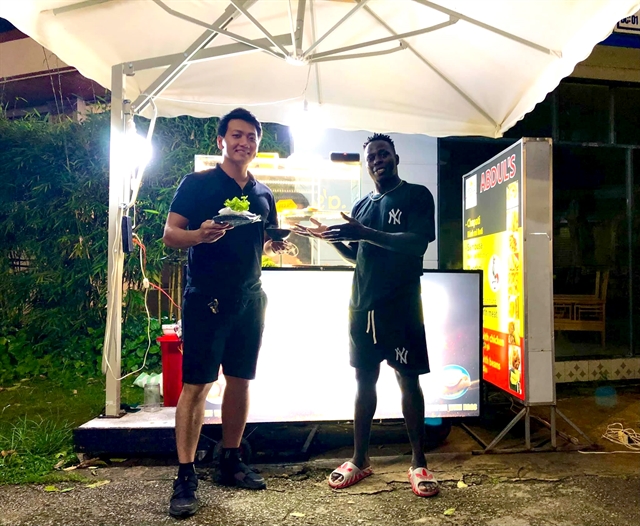
|
| Abdul decided to open an African-style Chapati shop with the support of a few friends. — Photo courtesy of Abdul Dogday |
According to Abdul, Chapati is an unleavened flatbread made from whole wheat flour. This type of bread is quite popular in India and is often eaten with curries, though it can also be used as regular toast or with other dishes. In Africa, Chapati is often served with eggs or minced meat.
In Uganda, egg-chapati is also known as Rolex, making many people mistakenly think this dish is related to the famous Swiss watch brand. In fact, this name comes from the strong pronunciation of the word 'rolled egg' by the locals, causing diners to mishear it as 'rolex'. The misinterpretation has stuck.
At Abdul's Chapati, each Rolex portion is made in about 3-5 minutes. This combination of eggs and fresh vegetables rolls into a chapati that closely resembles the shape of a sausage roll and is served with mayonnaise or chilli sauce.
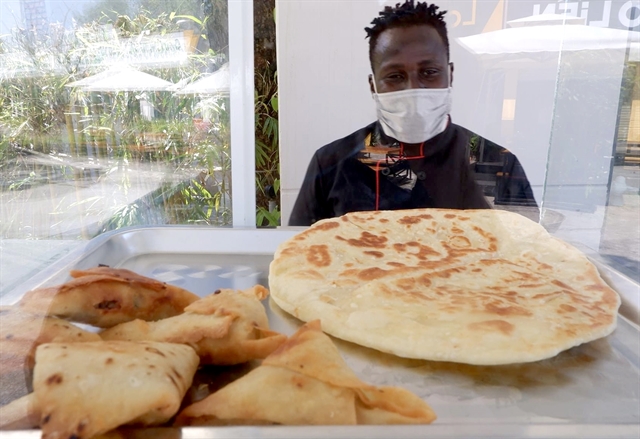
|
| Chapati is an unleavened flatbread made from whole wheat flour. — Photo courtesy of Abdul Dogday |
Hot Rolex is a perfect afternoon or evening snack. The dish has the rich flavour of eggs and is covered by a soft chapati crust. This Ugandan street food costs from VNĐ40-50,000 per portion.
In addition to Rolex, the shop also offers other dishes such as Sambusa (fried bread with meat filling) and Mandazi (fried bread). Price ranges from VNĐ15-30,000.
Besides mouth-watering dishes, diners who come to the chapati stall can also enjoy African music and dances performed by Abdul himself.
A lot of people fell in love with the food and this funny owner. Some even took videos of the shop and posted them on the internet, making the stall more and more popular.
Trang Uy, a customer of the restaurant, wrote on Facebook: "The food at Abdul's Chapati is so tasty. I am not only impressed by the African food, but also by the efforts and creativity of the artist Abdul. Highly recommend people to try and enjoy the food here.”
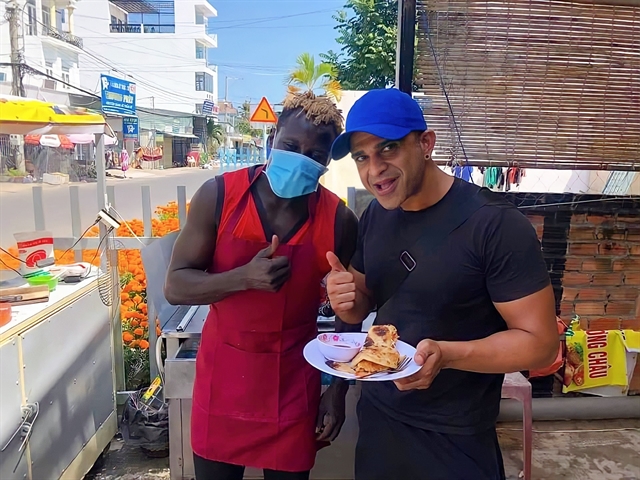
|
| Many customers love the Ugandan dishes made by Abdul. — Photo courtesy of Abdul Dogday |
From a small chapati stall, until now, Abdul's shop has been widely known by the Phú Quốc Island community and tourists.
“At first, locals seemed reluctant to approach me because they saw me as a foreigner. Gradually, people started to like me and help my restaurant be known by more customers”, Abdul said.
Sharing about the difficulties of starting a business in Việt Nam, Abdul said that the biggest challenge for him so far was the language barrier.
“I usually speak to customers in English, but as some customers only speak Vietnamese, communication is a big obstacle”.
With that in mind, Abdul decided to learn Vietnamese to be able to communicate with local customers.
Now, he is able to speak and understand simple Vietnamese sentences, thanks to the help of a friend.
“Learning Vietnamese helps me better understand Vietnamese culture and allows me to talk with my customers. I am very grateful to my Vietnamese friends who taught me Vietnamese and helped me through this difficult time,” he added.
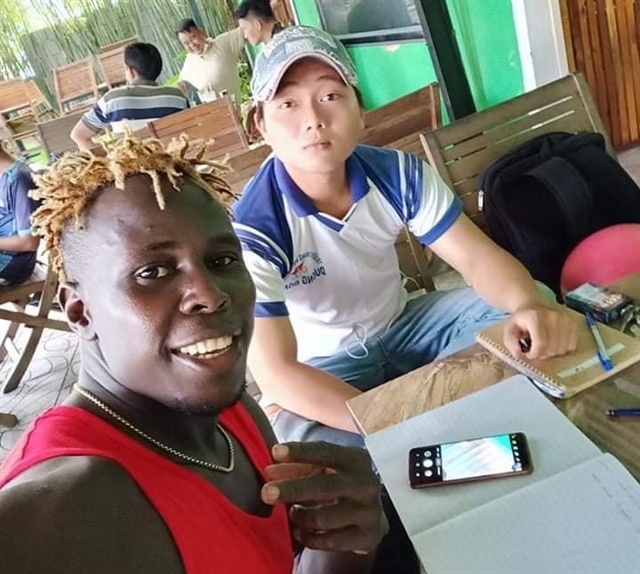
|
| Abdul asked a friend to teach him Vietnamese so he could communicate more with his customers. — Photo courtesy of Abdul Dogday |
Abdul also shared that he is building a few social media accounts to promote his restaurant. With photos and stories about daily life on the island, he hopes Ugandan food and culture will be spread more widely in the Vietnamese community.
“I hope that the pandemic will end soon so that I can return to my passion for dancing. But now, the chapati stall is my source of income and I am grateful for it”, he said. VNS


